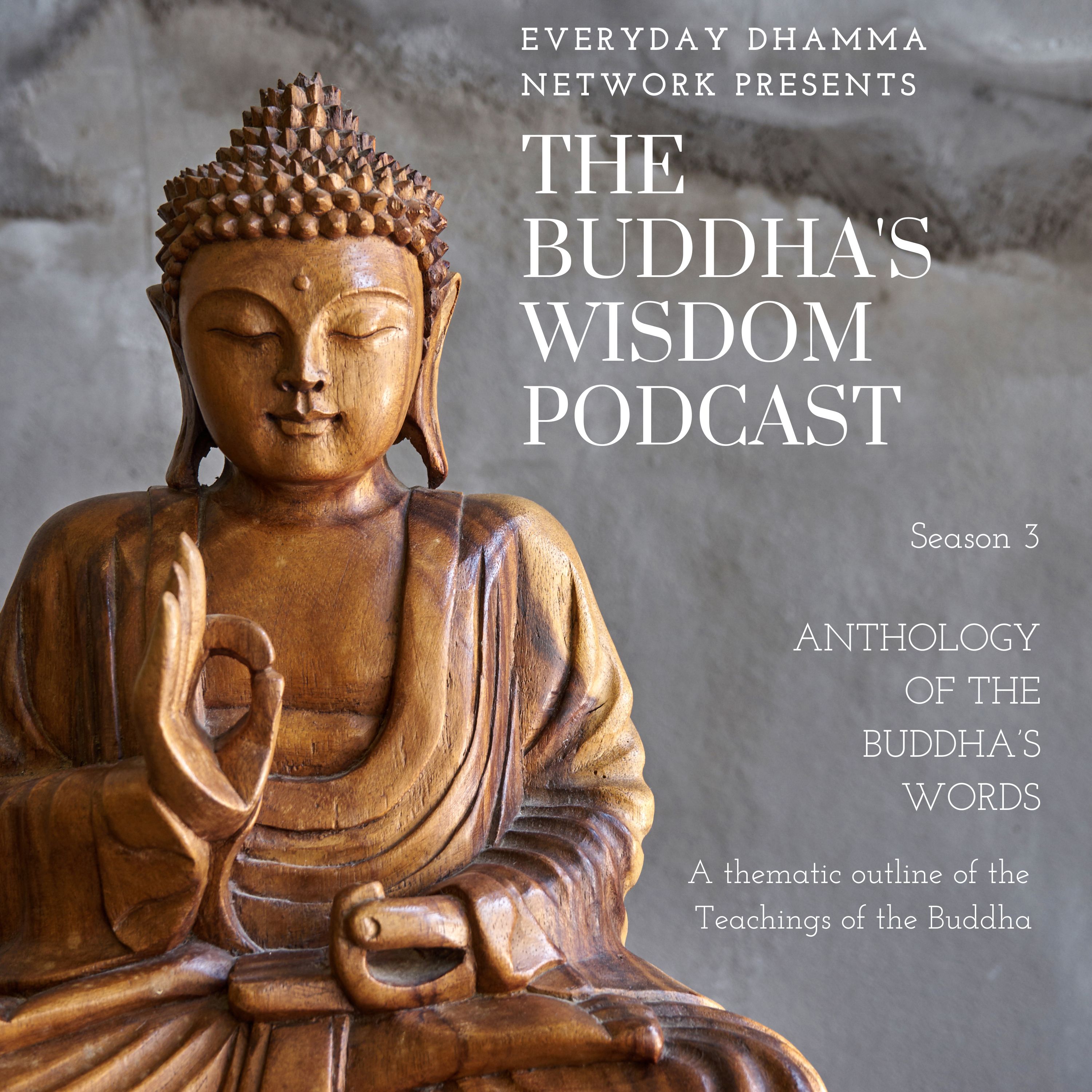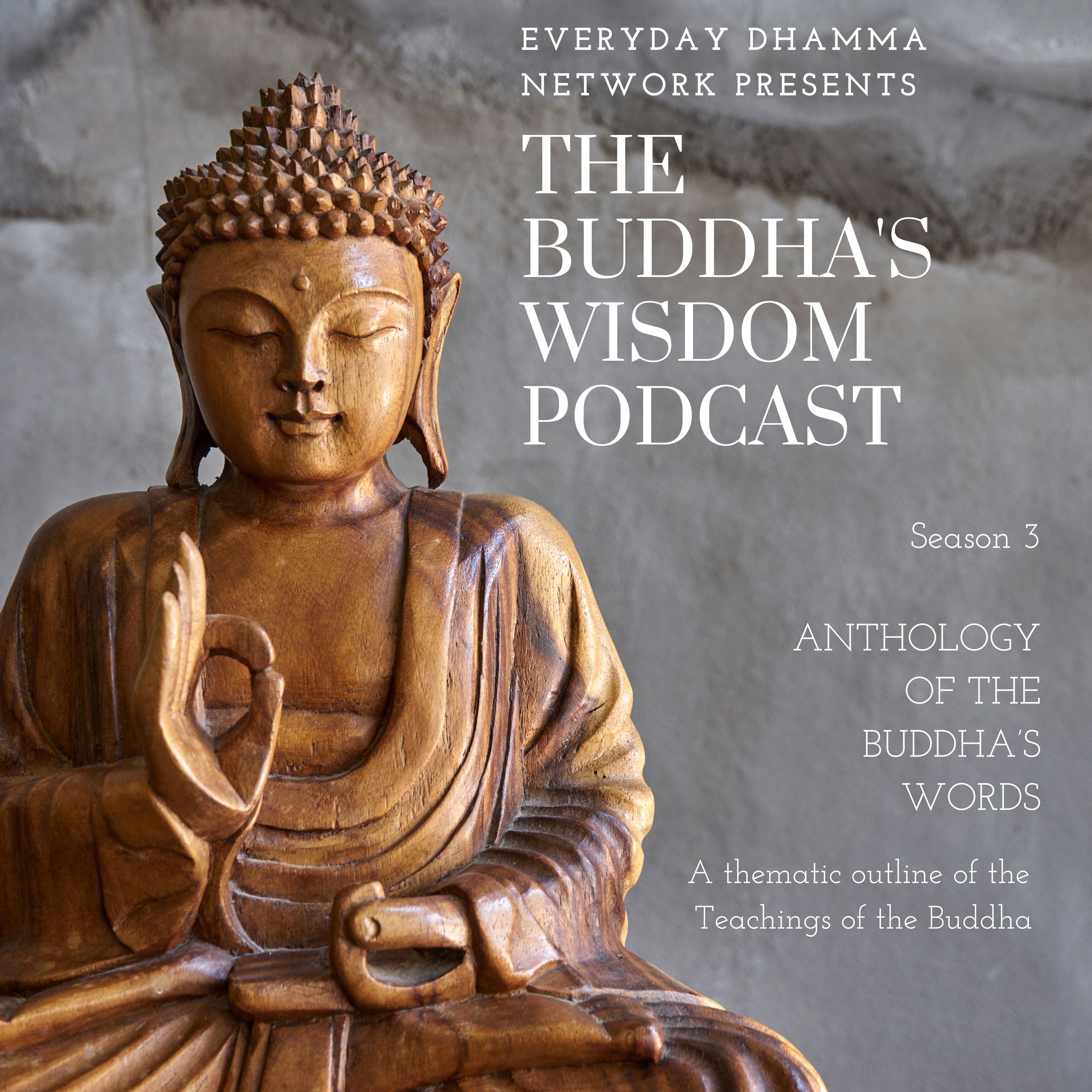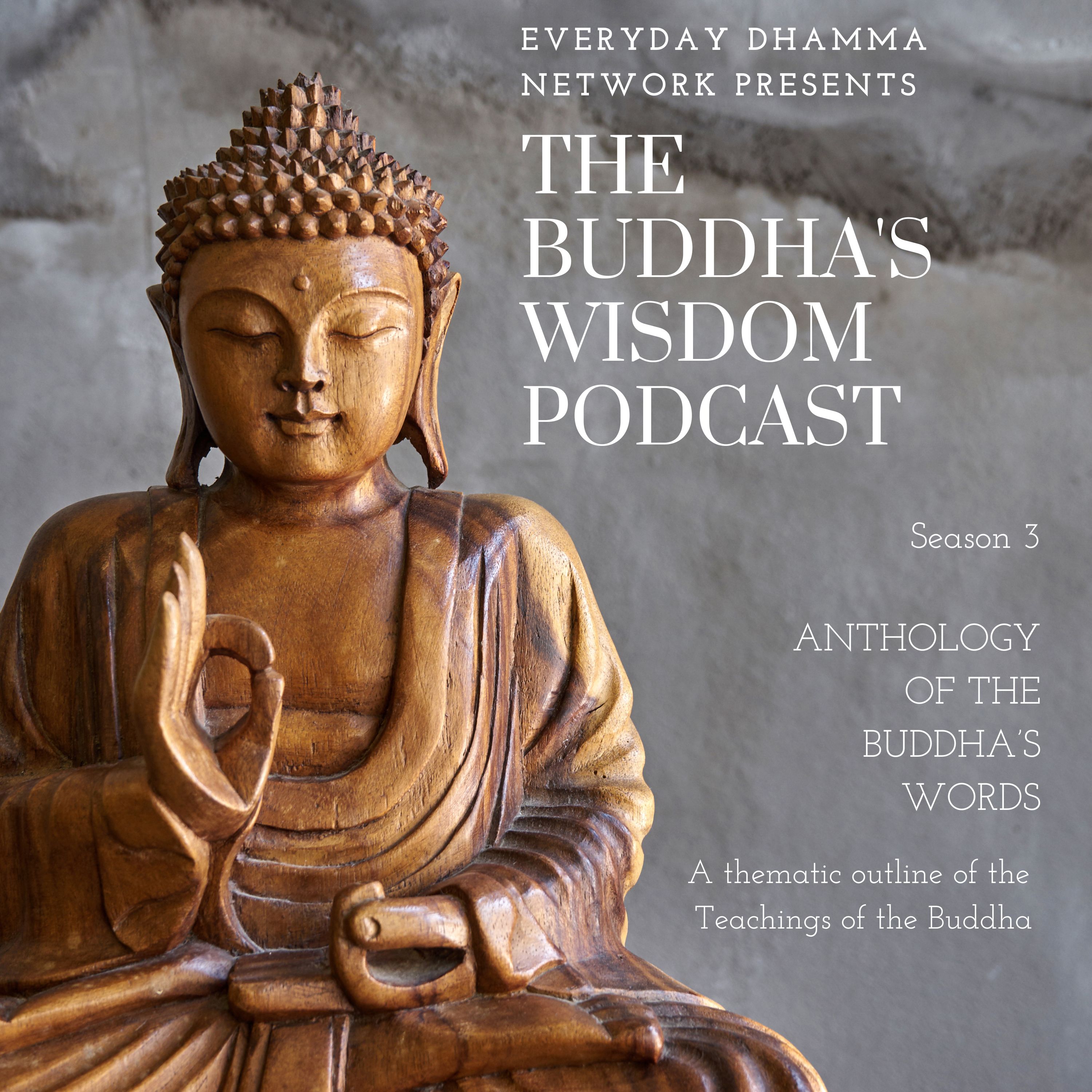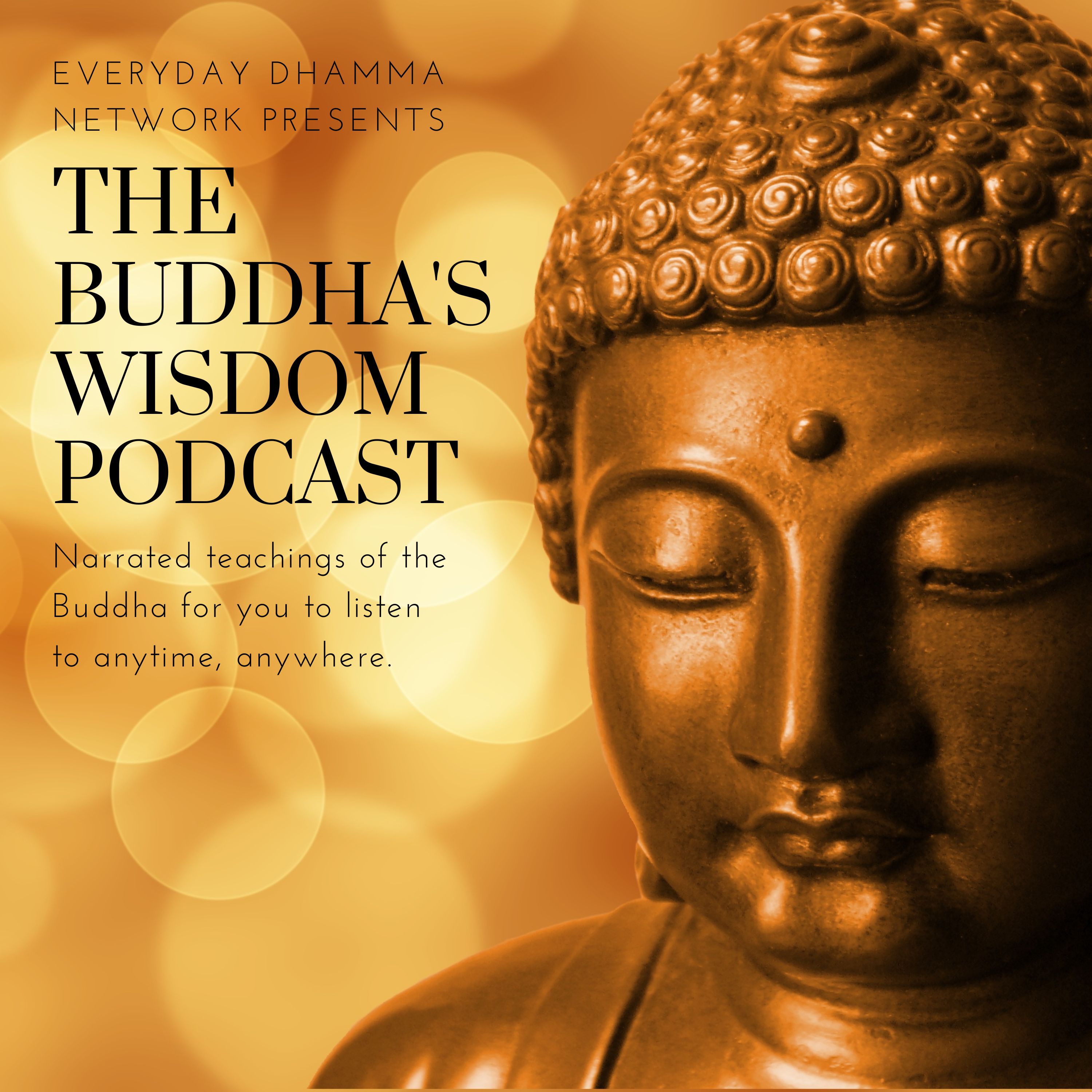Episode Transcript
## Sutta 1 - Six Roots of Dispute
Ānanda, there are these six roots of arguments. What six? Firstly, a mendicant is irritable and acrimonious. Such a mendicant lacks respect and reverence for the teacher, the teaching, and the Saṅgha, and they don’t fulfill the training. They create a dispute in the Saṅgha, which is for the detriment and suffering of the people, against the people, for the harm, detriment, and suffering of gods and humans. If you see such a root of arguments in yourselves or others, you should try to give up this bad thing. If you don’t see it, you should practice so that it doesn’t come up in the future. That’s how to give up this bad root of arguments, so it doesn’t come up in the future.
Furthermore, a mendicant is offensive and contemptuous … They’re jealous and stingy … They’re devious and deceitful … They have corrupt wishes and wrong view … They’re attached to their own views, holding them tight, and refusing to let go. Such a mendicant lacks respect and reverence for the teacher, the teaching, and the Saṅgha, and they don’t fulfill the training. They create a dispute in the Saṅgha, which is for the detriment and suffering of the people, against the people, for the harm, detriment, and suffering of gods and humans. If you see such a root of arguments in yourselves or others, you should try to give up this bad thing. If you don’t see it, you should practice so that it doesn’t come up in the future. That’s how to give up this bad root of arguments, so it doesn’t come up in the future. These are the six roots of arguments.
MN.104 Samagama Sutta
## Sutta 2 - Six Principles of Cordiality
Ānanda, these six warm-hearted qualities make for fondness and respect, conducing to inclusion, harmony, and unity, without quarreling. What six? Firstly, a mendicant consistently treats their spiritual companions with bodily kindness, both in public and in private. This warm-hearted quality makes for fondness and respect, conducing to inclusion, harmony, and unity, without quarreling.
Furthermore, a mendicant consistently treats their spiritual companions with verbal kindness … This too is a warm-hearted quality.
Furthermore, a mendicant consistently treats their spiritual companions with mental kindness … This too is a warm-hearted quality.
Furthermore, a mendicant shares without reservation any material things they have gained by legitimate means, even the food placed in the alms-bowl, using them in common with their ethical spiritual companions. This too is a warm-hearted quality.
Furthermore, a mendicant lives according to the precepts shared with their spiritual companions, both in public and in private. Those precepts are intact, impeccable, spotless, and unmarred, liberating, praised by sensible people, not mistaken, and leading to immersion. This too is a warm-hearted quality.
Furthermore, a mendicant lives according to the view shared with their spiritual companions, both in public and in private. That view is noble and emancipating, and delivers one who practices it to the complete ending of suffering. This too is a warm-hearted quality.
These six warm-hearted qualities make for fondness and respect, conducing to inclusion, harmony, and unity, without quarreling.
MN.104 Samagama Sutta
## Sutta 3 - Purification is for All Four Castes
So I have heard. At one time the Buddha was staying near Sāvatthī in Jeta’s Grove, Anāthapiṇḍika’s monastery.
Now at that time around five hundred brahmins from abroad were residing in Sāvatthī on some business. Then those brahmins thought, “This ascetic Gotama advocates purification for all four classes. Who is capable of debating with him about this?”
Now at that time the student Assalāyana was residing in Sāvatthī. He was young, tonsured, and sixteen years old. He had mastered the three Vedas, together with their vocabularies and ritual performance, their phonology and word classification, and the testaments as fifth. He knew them word-by-word, and their grammar. He was well versed in cosmology and the marks of a great man.
Then those brahmins thought, “This Assalāyana is capable of debating with the ascetic Gotama about this.”
So they approached Assalāyana and said to him, “This ascetic Gotama advocates purification for all four classes. Please, worthy Assalāyana, debate with the ascetic Gotama about this.”
When they said this, Assalāyana said to them, “They say that the ascetic Gotama is a speaker of principle. But speakers of principle are hard to debate. I’m not capable of debating with the ascetic Gotama about this.”
For a second time, those brahmins said to him “This ascetic Gotama advocates purification for all four classes. Please, worthy Assalāyana, debate with the ascetic Gotama about this. For you have lived as a wanderer.” And for a second time, Assalāyana refused.
For a third time, those brahmins said to him, “This ascetic Gotama advocates purification for all four classes. Please, worthy Assalāyana, debate with the ascetic Gotama about this. For you have lived as a wanderer. Don’t admit defeat before going into battle!”
When they said this, Assalāyana said to them, “Clearly, good fellows, I’m not getting through to you when I say: ‘They say that the ascetic Gotama is a speaker of principle. But speakers of principle are hard to debate. I’m not capable of debating with the ascetic Gotama about this.’ Nevertheless, I shall go at your bidding.”
Then Assalāyana together with a large group of brahmins went to the Buddha and exchanged greetings with him. When the greetings and polite conversation were over, he sat down to one side and said to the Buddha:
“Worthy Gotama, the brahmins say: ‘Only brahmins are the best class; other classes are inferior. Only brahmins are the light class; other classes are dark. Only brahmins are purified, not others. Only brahmins are true-born sons of divinity, born from his mouth, born of divinity, created by divinity, heirs of divinity.’ What do you say about this?”
“But Assalāyana, brahmin women are seen menstruating, being pregnant, giving birth, and breastfeeding. Yet even though they’re born from a brahmin womb they say: ‘Only brahmins are the best class; other classes are inferior. Only brahmins are the light class; other classes are dark. Only brahmins are purified, not others. Only brahmins are true-born sons of divinity, born from his mouth, born of divinity, created by divinity, heirs of divinity.’”
“Even though you say this, still the brahmins maintain their belief.”
“What do you think, Assalāyana? Have you heard that in Greece and Persia and other foreign lands there are only two classes, masters and bonded servants; and that masters may become servants, and servants masters?”
“Yes, I have heard that.”
“Then what is the source of the brahmins’ certainty and forcefulness in this matter that they make this claim?”
“Even though you say this, still the brahmins maintain their belief.”
“What do you think, Assalāyana? Suppose an aristocrat were to kill living creatures, steal, and commit sexual misconduct; to use speech that’s false, divisive, harsh, or nonsensical; and to be covetous, malicious, with wrong view. When their body breaks up, after death, they’d be reborn in a place of loss, a bad place, the underworld, hell. Would this happen only to an aristocrat, and not to a brahmin? Or suppose a peasant, or a menial were to act in the same way. Would that result befall only a peasant or a menial, and not to a brahmin?”
“No, worthy Gotama. If they acted the same way, the same result would befall an aristocrat, a brahmin, a peasant, or a menial. For if any of the four classes were to kill living creatures, steal, and commit sexual misconduct; to use speech that’s false, divisive, harsh, or nonsensical; and to be covetous, malicious, with wrong view, then, when their body breaks up, after death, they’d be reborn in a place of loss, a bad place, the underworld, hell.”
“Then what is the source of the brahmins’ certainty and forcefulness in this matter that they make this claim?”
“Even though you say this, still the brahmins maintain their belief.”
“What do you think, Assalāyana? Suppose a brahmin were to refrain from killing living creatures, stealing, and committing sexual misconduct; from using speech that’s false, divisive, harsh, or nonsensical; and from covetousness, malice, and wrong view. When their body breaks up, after death, they’d be reborn in a good place, a heavenly realm. Would this happen only to a brahmin, and not to an aristocrat, a peasant, or a menial?”
“No, worthy Gotama. If they acted the same way, the same result would befall an aristocrat, a brahmin, a peasant, or a menial. For if any of the four classes were to refrain from killing living creatures, stealing, and committing sexual misconduct; from using speech that’s false, divisive, harsh, or nonsensical; and from covetousness, malice, and wrong view, then, when their body breaks up, after death, they’d be reborn in a good place, a heavenly realm.”
“Then what is the source of the brahmins’ certainty and forcefulness in this matter that they make this claim?”
“Even though you say this, still the brahmins maintain their belief.”
“What do you think, Assalāyana? Is only a brahmin capable of developing a heart of love, free of enmity and ill will for this region, and not an aristocrat, peasant, or menial?”
“No, worthy Gotama. Aristocrats, brahmins, peasants, and menials can all do so. For all four classes are capable of developing a heart of love, free of enmity and ill will for this region.”
“Then what is the source of the brahmins’ certainty and forcefulness in this matter that they make this claim?”
“Even though you say this, still the brahmins maintain their belief.”
“What do you think, Assalāyana? Is only a brahmin capable of taking some bathing cleanser, going to the river, and washing off dust and dirt, and not an aristocrat, peasant, or menial?”
“No, worthy Gotama. All four classes are capable of doing this.”
“Then what is the source of the brahmins’ certainty and forcefulness in this matter that they make this claim?”
“Even though you say this, still the brahmins maintain their belief.”
“What do you think, Assalāyana? Suppose an anointed aristocratic king were to gather a hundred people of various births and say to them: ‘Please gentlemen, let anyone here who was born in a family of aristocrats, brahmins, or chieftains take a drill-stick made of teak, sal, frankincense wood, sandalwood, or cherry wood, light a fire and produce heat. And let anyone here who was born in a family of corpse-workers, hunters, bamboo-workers, chariot-makers, or scavengers take a drill-stick made from a dog’s drinking trough, a pig’s trough, a dustbin, or castor-oil wood, light a fire and produce heat.’
What do you think, Assalāyana? Would only the fire produced by the high class people with good quality wood have flames, color, and radiance, and be usable as fire, and not the fire produced by the low class people with poor quality wood?”
“No, worthy Gotama. The fire produced by the high class people with good quality wood would have flames, color, and radiance, and be usable as fire, and so would the fire produced by the low class people with poor quality wood. For all fire has flames, color, and radiance, and is usable as fire.”
“Then what is the source of the brahmins’ certainty and forcefulness in this matter that they make this claim?”
“Even though you say this, still the brahmins maintain their belief.”
“What do you think, Assalāyana? Suppose an aristocrat boy was to sleep with a brahmin girl, and they had a child. Would that child be called an aristocrat after the father or a brahmin after the mother?”
“They could be called either.”
“What do you think, Assalāyana? Suppose a brahmin boy was to sleep with an aristocrat girl, and they had a child. Would that child be called an aristocrat after the mother or a brahmin after the father?”
“They could be called either.”
“What do you think, Assalāyana? Suppose a mare were to mate with a donkey, and she gave birth to a mule. Would that mule be called a horse after the mother or a donkey after the father?”
“It’s a mule, as it is a crossbreed. I see the difference in this case, but not in the previous cases.”
“What do you think, Assalāyana? Suppose there were two young students who were brothers who had shared a womb. One was an educated reciter, while the other was not an educated reciter. Who would the brahmins feed first at an offering of food for ancestors, an offering of a dish of milk-rice, a sacrifice, or a feast for guests?”
“They’d first feed the young student who was an educated reciter. For how could an offering to someone who is not an educated reciter be very fruitful?”
“What do you think, Assalāyana? Suppose there were two young students who were brothers who had shared a womb. One was an educated reciter, but was unethical, of bad character, while the other was not an educated reciter, but was ethical and of good character. Who would the brahmins feed first?”
“They’d first feed the young student who was not an educated reciter, but was ethical and of good character. For how could an offering to someone who is unethical and of bad character be very fruitful?”
“Firstly you relied on birth, Assalāyana, then you switched to education, then you switched to abstemious behavior. Now you’ve come around to believing in purification for the four classes, just as I advocate.” When he said this, Assalāyana sat silent, dismayed, shoulders drooping, downcast, depressed, with nothing to say.
MN.93 Assalayana Sutta
## Sutta 4 - Seven Principles of Social Stability
So I have heard. At one time the Buddha was staying near Rājagaha, on the Vulture’s Peak Mountain. Now at that time King Ajātasattu of Magadha, son of the princess of Videha, wanted to invade the Vajjis. He declared: “I shall wipe out these Vajjis, so mighty and powerful! I shall destroy them, and lay ruin and devastation upon them!”
And then King Ajātasattu addressed Vassakāra the brahmin minister of Magadha, “Please, brahmin, go to the Buddha, and in my name bow with your head to his feet. Ask him if he is healthy and well, nimble, strong, and living comfortably. And then say: ‘Sir, King Ajātasattu of Magadha, son of the princess of Videha, wants to invade the Vajjis. He says, “I shall wipe out these Vajjis, so mighty and powerful! I shall destroy them, and lay ruin and devastation upon them!”’ Remember well how the Buddha answers and tell it to me. For Realized Ones say nothing that is not so.”
“Yes, worthy sir,” Vassakāra replied. He had the finest carriages harnessed. Then he mounted a fine carriage and, along with other fine carriages, set out from Rājagaha for the Vulture’s Peak Mountain. He went by carriage as far as the terrain allowed, then descended and approached the Buddha on foot, and exchanged greetings with him.
When the greetings and polite conversation were over, he sat down to one side and said to the Buddha, “Worthy Gotama, King Ajātasattu of Magadha, son of the princess of Videha, bows with his head to your feet. He asks if you are healthy and well, nimble, strong, and living comfortably. Worthy Gotama, King Ajātasattu wants to invade the Vajjis. He has declared: ‘I shall wipe out these Vajjis, so mighty and powerful! I shall destroy them, and lay ruin and devastation upon them!’”
Now at that time Venerable Ānanda was standing behind the Buddha fanning him. Then the Buddha said to him, “Ānanda, have you heard that the Vajjis meet frequently and have many meetings?”
“I have heard that, sir.”
“As long as the Vajjis meet frequently and have many meetings, they can expect growth, not decline.
Ānanda, have you heard that the Vajjis meet in harmony, leave in harmony, and carry on their business in harmony?”
“I have heard that, sir.”
“As long as the Vajjis meet in harmony, leave in harmony, and carry on their business in harmony, they can expect growth, not decline.
Ānanda, have you heard that the Vajjis don’t make new decrees or abolish existing decrees, but proceed having undertaken the ancient Vajjian traditions as they have been decreed?”
“I have heard that, sir.”
“As long as the Vajjis don’t make new decrees or abolish existing decrees, but proceed having undertaken the ancient Vajjian traditions as they have been decreed, they can expect growth, not decline.
Ānanda, have you heard that the Vajjis honor, respect, esteem, and venerate Vajjian elders, and think them worth listening to?”
“I have heard that, sir.”
“As long as the Vajjis honor, respect, esteem, and venerate Vajjian elders, and think them worth listening to, they can expect growth, not decline.
Ānanda, have you heard that the Vajjis don’t forcibly abduct the women or girls of the clans and make them live with them?”
“I have heard that, sir.”
“As long as the Vajjis don’t forcibly abduct the women or girls of the clans and make them live with them, they can expect growth, not decline.
Ānanda, have you heard that the Vajjis honor, respect, esteem, and venerate the Vajjian shrines, whether inner or outer, not neglecting the proper spirit-offerings that were given and made in the past?”
“I have heard that, sir.”
“As long as the Vajjis honor, respect, esteem, and venerate the Vajjian shrines, whether inner or outer, not neglecting the proper spirit-offerings that were given and made in the past, they can expect growth, not decline.
Ānanda, have you heard that the Vajjis organize proper protection, shelter, and security for perfected ones, so that more perfected ones might come to the realm and those already here may live in comfort?”
“I have heard that, sir.”
“As long as the Vajjis organize proper protection, shelter, and security for perfected ones, so that more perfected ones might come to the realm and those already here may live in comfort, they can expect growth, not decline.”
Then the Buddha said to Vassakāra, “Brahmin, this one time I was staying near Vesālī at the Sārandada Shrine. There I taught the Vajjis these seven principles that prevent decline. As long as these seven principles that prevent decline last among the Vajjis, and as long as the Vajjis are seen following them, they can expect growth, not decline.”
DN.16 Mahaparinibbana Sutta
## Sutta 5 - Wheel Turning Monarch
Then, after many years, many hundred years, many thousand years had passed, King Daḷhanemi addressed one of his men, ‘My good man, when you see that the heavenly wheel-treasure has receded back from its place, please tell me.’
‘Yes, Your Majesty,’ replied that man.
After many thousand years had passed, that man saw that the heavenly wheel-treasure had receded back from its place. So he went to King Daḷhanemi and said, ‘Please sire, you should know that your heavenly wheel-treasure has receded back from its place.’
So the king summoned the crown prince and said, ‘Dear prince, my heavenly wheel-treasure has receded back from its place. I’ve heard that when this happens to a wheel-turning monarch, he does not have long to live. I have enjoyed human pleasures. Now it is time for me to seek heavenly pleasures. Come, dear prince, rule this land surrounded by ocean! I shall shave off my hair and beard, dress in ocher robes, and go forth from the lay life to homelessness.’
And so, after carefully instructing the crown prince in kingship, King Daḷhanemi shaved off his hair and beard, dressed in ocher robes, and went forth from the lay life to homelessness. Seven days later the heavenly wheel-treasure vanished.
Then a certain man approached the newly anointed aristocrat king and said, ‘Please sire, you should know that the heavenly wheel-treasure has vanished.’ At that the king was unhappy and experienced unhappiness. He went to the royal seer and said, ‘Please sire, you should know that the heavenly wheel-treasure has vanished.’
When he said this, the royal seer said to him, ‘Don’t be unhappy at the vanishing of the wheel-treasure. My dear, the wheel-treasure is not inherited from your father. Come now, my dear, proceed in the noble duty of a wheel-turning monarch. If you do so, it’s possible that—on a fifteenth day sabbath, having bathed your head and gone upstairs in the royal longhouse to observe the sabbath—the heavenly wheel-treasure will appear to you, with a thousand spokes, with rim and hub, complete in every detail.’
‘But sire, what is the noble duty of a wheel-turning monarch?’
‘Well then, my dear, relying only on principle—honoring, respecting, and venerating principle, having principle as your flag, banner, and authority—provide just protection and security for your court, troops, aristocrats, vassals, brahmins and householders, people of town and country, ascetics and brahmins, beasts and birds. Do not let injustice prevail in the realm. Provide money to the penniless in the realm.
And there are ascetics and brahmins in the realm who refrain from intoxication and negligence, are settled in patience and gentleness, and who tame, calm, and extinguish themselves. From time to time you should go up to them and ask and learn: “Sirs, what is skillful? What is unskillful? What is blameworthy? What is blameless? What should be cultivated? What should not be cultivated? Doing what leads to my lasting harm and suffering? Doing what leads to my lasting welfare and happiness?” Having heard them, you should reject what is unskillful and undertake and follow what is skillful.
This is the noble duty of a wheel-turning monarch.’
‘Yes, Your Majesty,’ replied the new king to the royal seer. And he proceeded in the noble duty of a wheel-turning monarch.
While he was proceeding in that duty, on a fifteenth day sabbath, he had bathed his head and gone upstairs in the royal longhouse to observe the sabbath. And the heavenly wheel-treasure appeared to him, with a thousand spokes, with rim and hub, complete in every detail. Seeing this, the king thought, ‘I have heard that when the heavenly wheel-treasure appears to a king in this way, he becomes a wheel-turning monarch. Am I then a wheel-turning monarch?’
Then the anointed king, rising from his seat and arranging his robe over one shoulder, took a ceremonial vase in his left hand and besprinkled the wheel-treasure with his right hand, saying, ‘Roll forth, O wheel-treasure! Triumph, O wheel-treasure!’
Then the wheel-treasure rolled towards the east. And the king followed it together with his army of four divisions. In whatever place the wheel-treasure stood still, there the king came to stay together with his army. And any opposing rulers of the eastern quarter came to the wheel-turning monarch and said, ‘Come, great king! Welcome, great king! We are yours, great king, instruct us.’ The wheel-turning monarch said, ‘Do not kill living creatures. Do not steal. Do not commit sexual misconduct. Do not lie. Do not drink liquor. Maintain the current level of taxation.’ And so the opposing rulers of the eastern quarter became his vassals.
Then the wheel-treasure, having plunged into the eastern ocean and emerged again, rolled towards the south. … Having plunged into the southern ocean and emerged again, it rolled towards the west. …
Having plunged into the western ocean and emerged again, it rolled towards the north, followed by the king together with his army of four divisions. In whatever place the wheel-treasure stood still, there the king came to stay together with his army. And any opposing rulers of the northern quarter came to the wheel-turning monarch and said, ‘Come, great king! Welcome, great king! We are yours, great king, instruct us.’ The wheel-turning monarch said, ‘Do not kill living creatures. Do not steal. Do not commit sexual misconduct. Do not lie. Do not drink liquor. Maintain the current level of taxation.’ And so the rulers of the northern quarter became his vassals.
And then the wheel-treasure, having triumphed over this land surrounded by ocean, returned to the royal capital. There it stood still by the gate to the royal compound at the High Court as if fixed to an axle, illuminating the royal compound.
DN.26 Cakkavatti-Sihanada Sutta
## Sutta 6 - Bringing Tranquility to the Land
Kūṭadanta said to the Buddha, “Worthy Gotama, I’ve heard that you know how to accomplish the sacrifice with three modes and sixteen accessories. I don’t know about that, but I wish to perform a great sacrifice. Please teach me how to accomplish the sacrifice with three modes and sixteen accessories.”
“Well then, brahmin, listen and apply your mind well, I will speak.”
“Yes, worthy sir,” Kūṭadanta replied. The Buddha said this: “Once upon a time, brahmin, there was a king named Mahāvijita. He was rich, affluent, and wealthy, with lots of gold and silver, lots of property and assets, lots of money and grain, and a full treasury and storehouses. Then as King Mahāvijita was in private retreat this thought came to his mind: ‘I have achieved human wealth, and reign after conquering this vast territory. Why don’t I hold a large sacrifice? That will be for my lasting welfare and happiness.’
Then he summoned the brahmin high priest and said to him: ‘Just now, brahmin, as I was in private retreat this thought came to mind, “I have achieved human wealth, and reign after conquering this vast territory. Why don’t I perform a great sacrifice? That will be for my lasting welfare and happiness.” Brahmin, I wish to perform a great sacrifice. Please instruct me. It will be for my lasting welfare and happiness.’
When he had spoken, the brahmin high priest said to him: ‘Sir, the king’s realm is harried and oppressed. Raiding of villages, towns, and cities has been seen, and infesting of highways. But if the king were to extract more taxes while his realm is thus harried and oppressed, he would not be doing his duty.
Now the king might think, “I’ll eradicate this plague of savages by execution or imprisonment or confiscation or condemnation or banishment!” But that’s not the right way to eradicate this plague of savages. Those who remain after the killing will return to harass the king’s realm.
Rather, here is a plan, relying on which the plague of savages will be properly uprooted. So let the king provide seed and fodder for those in the realm who work in growing crops and raising cattle. Let the king provide funding for those who work in trade. Let the king guarantee food and wages for those in government service. Then the people, occupied with their own work, will not harass the realm. The king’s revenues will be great. When the country is secured as a sanctuary, free of being harried and oppressed, the happy people, with joy in their hearts, dancing with children at their breast, will dwell as if their houses were wide open.’
The king agreed with the high priest’s advice and followed his recommendation.
DN.5 Kutadanta Sutta




